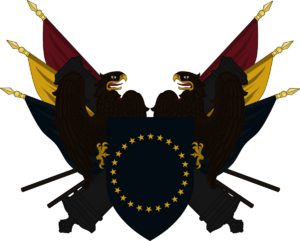Constitution of Carloso: Difference between revisions
mNo edit summary |
|||
| Line 11: | Line 11: | ||
| date_ratified = | | date_ratified = | ||
| date_effective = 20 June 1956 | | date_effective = 20 June 1956 | ||
| system = | | system = Federal parliamentary republic with an executive presidency | ||
| branches = | | branches = | ||
| chambers = Unicameral | | chambers = Unicameral | ||
| executive = [[President of Carloso|President]] | | executive = [[President of Carloso|President]] | ||
| courts = | | courts = | ||
| federalism = Federation | | federalism = Federation | ||
| electoral_college = | | electoral_college = | ||
| Line 31: | Line 31: | ||
| supersedes = | | supersedes = | ||
}} | }} | ||
The '''Constitution of the Federal Republic of Carloso''' (Carlosian: ''TBD'') is the | The '''Constitution of the Federal Republic of Carloso''' (Carlosian: ''TBD'') is the fundamental law of Carloso. | ||
While the constitution ''de jure'' established Carloso as a federal, parliamentary republic, since its enactment there has been much debate about whether this is the case in reality. Constitutional scholars had remarked that, in reality, Carlosian federalism is better described as a form of devolution, as seen in many unitary states. Few of the powers given to the provinces are constitutionally protected, and most have been granted purely at the discretion of the National Assembly. | |||
==Background== | ==Background== | ||
Revision as of 20:33, 5 October 2023
This article is incomplete because it is pending further input from participants, or it is a work-in-progress by one author. Please comment on this article's talk page to share your input, comments and questions. Note: To contribute to this article, you may need to seek help from the author(s) of this page. |
| Constitution of Carloso | |
|---|---|
 | |
| Jurisdiction | |
| Date effective | 20 June 1956 |
| System | Federal parliamentary republic with an executive presidency |
| Chambers | Unicameral |
| Executive | President |
| Federalism | Federation |
The Constitution of the Federal Republic of Carloso (Carlosian: TBD) is the fundamental law of Carloso.
While the constitution de jure established Carloso as a federal, parliamentary republic, since its enactment there has been much debate about whether this is the case in reality. Constitutional scholars had remarked that, in reality, Carlosian federalism is better described as a form of devolution, as seen in many unitary states. Few of the powers given to the provinces are constitutionally protected, and most have been granted purely at the discretion of the National Assembly.
Background
History
Influences
Main provisions
Current text
Preamable
Article I
THE NATIONAL ASSEMBLY
1. Legislative power will be vested in the National Assembly. Members of the National Assembly will be referred to as National Assemblymen and elected every five years on 11 November, taking office on 11 February of the following year Candidates seeking the office of National Assemblyman must be natural-born citizens of Carloso, resident in the country, and have attained the age of thirty years by or on the day of election. National Assemblymen will be elected from three-member constituencies by means of the single transferable vote. Should a National Assemblyman vacate their seat, a by-election will by held within five calendar months to fill that vacancy, unless in the insistence where the vacancy occurs within one annual year of the next general election.